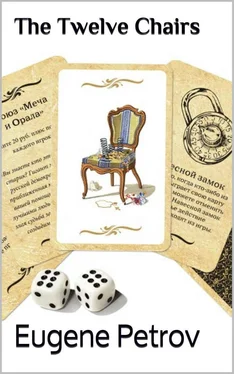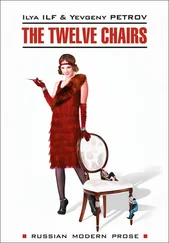Eugene Petrov - The Twelve Chairs
Здесь есть возможность читать онлайн «Eugene Petrov - The Twelve Chairs» весь текст электронной книги совершенно бесплатно (целиком полную версию без сокращений). В некоторых случаях можно слушать аудио, скачать через торрент в формате fb2 и присутствует краткое содержание. Год выпуска: 2013, Жанр: Юмористическая проза, на английском языке. Описание произведения, (предисловие) а так же отзывы посетителей доступны на портале библиотеки ЛибКат.
- Название:The Twelve Chairs
- Автор:
- Жанр:
- Год:2013
- ISBN:нет данных
- Рейтинг книги:5 / 5. Голосов: 1
-
Избранное:Добавить в избранное
- Отзывы:
-
Ваша оценка:
- 100
- 1
- 2
- 3
- 4
- 5
The Twelve Chairs: краткое содержание, описание и аннотация
Предлагаем к чтению аннотацию, описание, краткое содержание или предисловие (зависит от того, что написал сам автор книги «The Twelve Chairs»). Если вы не нашли необходимую информацию о книге — напишите в комментариях, мы постараемся отыскать её.
Find traces of a separate headset difficult and heroes face different adventures and troubles.
The Twelve Chairs — читать онлайн бесплатно полную книгу (весь текст) целиком
Ниже представлен текст книги, разбитый по страницам. Система сохранения места последней прочитанной страницы, позволяет с удобством читать онлайн бесплатно книгу «The Twelve Chairs», без необходимости каждый раз заново искать на чём Вы остановились. Поставьте закладку, и сможете в любой момент перейти на страницу, на которой закончили чтение.
Интервал:
Закладка:
by a moustache, each side of which resembled a shaving brush.
Ippolit Matveyevich left the house in rather an irritable mood.
Bezenchuk the undertaker was standing at the entrance to his tumble-down
establishment, leaning against the door with his hands crossed. The regular
collapse of his commercial undertakings plus a long period of practice in
the consumption of intoxicating drinks had made his eyes bright yellow like
a cat's, and they burned with an unfading light.
"Greetings to an honoured guest!" he rattled off, seeing Vorobyaninov.
"Good mornin'."
Ippolit Matveyevich politely raised his soiled beaver hat. "How's your
mother-in-law, might I inquire? " "Mrr-mrr," said Ippolit Matveyevich
indistinctly, and shrugging his shoulders, continued on his way.
"God grant her health," said Bezenchuk bitterly. "Nothin' but losses,
durn it." And crossing his hands on his chest, he again leaned against the
doorway.
At the entrance to the Nymph Funeral Home Ippolit Matveyevich was
stopped once more. There were three owners of the Nymph. They all bowed to
Ippolit Matveyevich and inquired in chorus about his mother-in-law's health.
"She's well," replied Ippolit Matveyevich. "The things she does! Last
night she saw a golden girl with her hair down. It was a dream."
The three Nymphs exchanged glances and sighed loudly.
These conversations delayed Vorobyaninov on his way, and contrary to
his usual practice, he did not arrive at work until the clock on the wall
above the slogan "Finish Your Business and Leave" showed five past nine.
Because of his great height, and particularly because of his moustache,
Ippolit Matveyevich was known in the office as Maciste.* although the real
Maciste had no moustache. ( Translator's Note: Maciste was an
internationally known Italian actor of the time.)
Taking a blue felt cushion out of a drawer in the desk, Ippolit
Matveyevich placed it on his chair, aligned his moustache correctly
(parallel to the top of the desk) and sat down on the cushion, rising
slightly higher than his three colleagues. He was not afraid of getting
piles; he was afraid of wearing out his trousers-that was why he used the
blue cushion.
All these operations were watched timidly by two young persons-a boy
and a girl. The young man, who wore a padded cotton coat, was completely
overcome by the office atmosphere, the chemical smell of the ink, the clock
that was ticking loud and fast, and most of all by the sharply worded notice
"Finish Your Business and Leave". The young man in the coat had not even
begun his business, but he was nonetheless ready to leave. He felt his
business was so insignificant that it was shameful to disturb such a
distinguished-looking grey-haired citizen as Vorobyaninov. Ippolit
Matveyevich also felt the young man's business was a trifling one and could
wait, so he opened folder no. 2 and, with a twitch of the cheek, immersed
himself in the papers. The girl, who had on a long jacket edged with shiny
black ribbon, whispered something to the young man and, pink with
embarrassment, began moving toward Ippolit Matveyevich.
"Comrade," she said, "where do we . . ."
The young man in the padded coat sighed with pleasure and, unexpectedly
for himself, blurted out:
"Get married!"
Ippolit Matveyevich looked thoughtfully at the rail behind which the
young couple were standing.
"Birth? Death?"
"Get married?" repeated the young man in the coat and looked round him
in confusion.
The girl gave a giggle. Things were going fine. Ippolit Matveyevich set
to work with the skill of a magician. In spidery handwriting he recorded the
names of the bride and groom in thick registers, sternly questioned the
witnesses, who had to be fetched from outside, breathed tenderly and
lengthily on the square rubber stamps and then, half rising to his feet,
impressed them upon the tattered identification papers. Having received two
roubles from the newly-weds "for administration of the sacrament", as he
said with a smirk, and given them a receipt, Ippolit Matveyevich drew
himself up to his splendid height, automatically pushing out his chest (he
had worn a corset at one time). The wide golden rays of the sun fell on his
shoulders like epaulettes. His appearance was slightly comic, but singularly
impressive. The biconcave lenses of his pince-nez flashed white like
searchlights. The young couple stood in awe.
"Young people," said Ippolit Matveyevich pompously, "allow me to
congratulate you, as they used to say, on your legal marriage. It is very,
very nice to see young people like yourselves moving hand in hand toward the
realization of eternal ideals. It is very, ve-ery nice!'
Having made this address, Ippolit Matveyevich shook hands with the
newly married couple, sat down, and, extremely pleased with himself,
continued to read the papers in folder no. 2. At the next desk the clerks
sniggered into their ink-wells. The quiet routine of the working day had
begun. No one disturbed the deaths-and-marriages desk. Through the windows
citizens could be seen making their way home, shivering in the spring
chilliness. At exactly midday the cock in the Hammer and Plough co-operative
began crowing. Nobody was surprised. Then came the mechanical rattling and
squeaking of a car engine. A thick cloud of violet smoke billowed out from
Comrade Gubernsky Street, and the clanking grew louder. Through the smoke
appeared the outline of the regional-executive-committee car Gos. No. 1 with
its minute radiator and bulky body. Floundering in the mud as it went, the
car crossed Staropan Square and, swaying from side to side, disappeared in a
cloud of poisonous smoke. The clerks remained standing at the window for
some time, commenting on the event and attempting to connect it with a
possible reduction in staff. A little while later Bezenchuk cautiously went
past along the footboards. For days on end he used to wander round the town
trying to find out if anyone had died.
The working day was drawing to a close. In the nearby white and yellow
belfry the bells began ringing furiously. Windows rattled. Jackdaws rose one
by one from the belfry, joined forces over the square, held a brief meeting,
and flew off. The evening sky turned ice-grey over the deserted square.
It was time for Ippolit Matveyevich to leave. Everything that was to be
born on that day had been born and registered in the thick ledgers. All
those wishing to get married had done so and were likewise recorded in the
thick registers. And, clearly to the ruin of the undertakers, there had not
been a single death. Ippolit Matveyevich packed up his files, put the felt
cushion away in the drawer, fluffed up his moustache with a comb, and was
just about to leave, having visions of a bowl of steaming soup, when the
door burst open and Bezenchuk the undertaker appeared on the threshold.
"Greetings to an honoured guest," said Ippolit Matveyevich with a
smile. "What can I do for you?"
The undertaker's animal-like face glowed in the dusk, but he was unable
to utter a word.
"Well?" asked Ippolit Matveyevich more severely.
"Does the Nymph, durn it, really give good service?" said the
undertaker vaguely. "Can they really satisfy customers? Why, a coffin needs
so much wood alone."
"What?" asked Ippolit Matveyevich.
"It's the Nymph. . . . Three families livin' on one rotten business.
And their materials ain't no good, and the finish is worse. What's more, the
Читать дальшеИнтервал:
Закладка:
Похожие книги на «The Twelve Chairs»
Представляем Вашему вниманию похожие книги на «The Twelve Chairs» списком для выбора. Мы отобрали схожую по названию и смыслу литературу в надежде предоставить читателям больше вариантов отыскать новые, интересные, ещё непрочитанные произведения.
Обсуждение, отзывы о книге «The Twelve Chairs» и просто собственные мнения читателей. Оставьте ваши комментарии, напишите, что Вы думаете о произведении, его смысле или главных героях. Укажите что конкретно понравилось, а что нет, и почему Вы так считаете.












